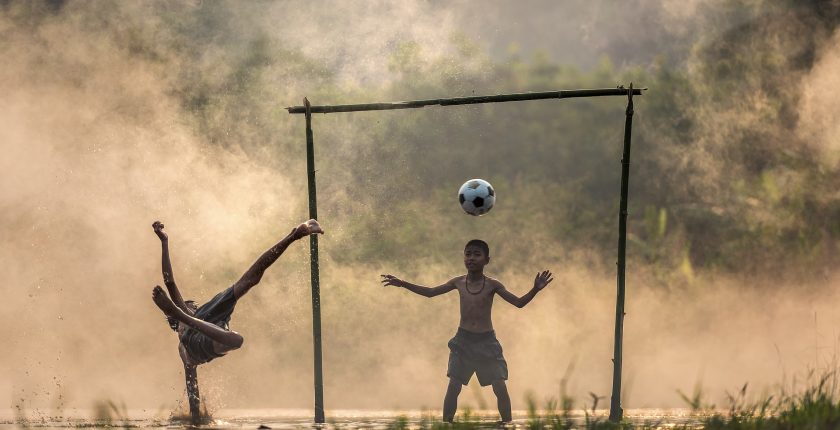Sport as a Way to Heal Trauma for Child Refugees
The Challenges Faced by Child Refugees
Since 2010 the number of people being forcibly displaced due to conflicts, violence, and persecution has doubled, reaching a total of 82.4 million people in 2020. Of this number 25% are refugees, equating to 26.4 million people (UNHCR, 2020), and 12.6 million of these are children (UNICEF, 2020).
Children make up less than a third of the world’s total population and yet represent 50% of the refugee population. Consequently, the refugee population tends to be much younger than the general migrant population. As such, they face a variety of unique problems associated with their age and their status as refugees.
Becoming a refugee can present a multitude of bureaucratic and social barriers, which blocks access to basic human rights. As such these child refugees face impaired access to essential services needed for healthy child development such as schooling, healthcare, clean water, healthy nutritious food, and other social services.
Many child refugees have also endured traumatising events, often witnessing, or experiencing violence, exile, neglect, and abuse. The experience of trauma is not limited to child refugees pre-migration countries or situations. They can also accumulate on the journey or be encountered when situated in a host country. For example, a child refugee may have been separated from family members in the process of leaving their respective countries. 37% of children refugees arriving in Europe were unaccompanied (UNICEF, 2017). A child refugee is unlikely to know the whereabouts of a missing family member or know the status of their well-being. These children then shoulder an intense burden yet often feel powerless to do anything. This can be compounded by the challenge of navigating a new culture, financial concerns, and negative local to refugee relationships.
As such trauma for a child refugee is a multi-layered experience, resulting from pre-migration, the journey to a new host country, and then the challenges encountered in the host country itself.
The Impact of Trauma on Mental Health – Sport Facilitates a Space to Heal
At such a young age this trauma can lead to developmental scars that are hard to heal if left ignored and unaddressed. Traumatic events can affect a child’s emotional and cognitive development, negatively influencing their self-perception and also their perception of adults or people in authority. In the long-term childhood trauma can lead to depression, a higher likelihood of unemployment, and poverty.
Sport is increasingly becoming recognised as an incredible tool that enables children to cope, heal and progress towards positive futures. Team sports can facilitate beneficial relational interactions that can help overcome social divides between groups. Furthermore, the mind space sport facilitates enables better psychological responses providing a much-needed space to heal and make sense of traumatic experiences.
The Olympic Refuge Foundations – Sport for 1 Million Displaced Young People.
The Olympic Refuge Foundation set up by the International Olympic Committee in 2017 aims to provide access to safe sport for one million young people affected by displacement by 2024. To meet this aim, they have initiated multiple projects that promote sport as a means for development. One such initiative partners with four organisations (the UNHCR, the Uganda Olympic Committee, Right to Play and the AVSI Foundation) and works alongside Youth Sport Uganda to improve the mental health of young refugees in Uganda. This is mainly facilitated through partnerships with community-based coaches who deliver quality educational and sports-based programs and activities. The confidence, skills, and opportunities this initiative is providing have already benefited young refugees, increasing their self-esteem and improving their mental well-being.
Bibliography
Right to Play, (2021) Protect. Educate. Empower, https://righttoplay.org.uk/en-uk/impact/
Fleming, S,. (18th June 2021) This is the global refugee situation, in numbers, https://www.weforum.org/agenda/2021/06/unhcr-how-many-refugees/
UNHCR, (2021) Refugee Data Finder, https://www.unhcr.org/refugee-statistics/
UNICEF, (2021) Child Displacement, https://data.unicef.org/topic/child-migration-and-displacement/displacement/
Amnesty International, (2019) The Impact of family separation on child refugees in the UK, https://www.amnesty.org.uk/files/2020-02/Without_my_family_report.pdf?bmYG2_9kNYxBEpy2gPZ_VJTU4pWZT7Ay=
UNICEF, (2017) Latest statistics and graphics on refugee and migrant children, https://www.unicef.org/eca/emergencies/latest-statistics-and-graphics-refugee-and-migrant-children
Park, M and Katsiaficas, C,. (April 2019) Latest statistics and graphics on refugee and migrant children, https://www.migrationpolicy.org/sites/default/files/publications/ECEC-Trauma-Informed-Care-Final.pdf
International Olympic Committee, 12th October 2020, Improving the mental health of young refugees in Uganda through sport, https://olympics.com/ioc/news/improving-the-mental-health-of-young-refugees-in-uganda-through-sport

